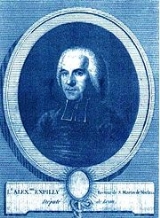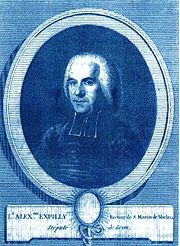
Louis-Alexandre Expilly de la Poipe
Encyclopedia

Brest, France
Brest is a city in the Finistère department in Brittany in northwestern France. Located in a sheltered position not far from the western tip of the Breton peninsula, and the western extremity of metropolitan France, Brest is an important harbour and the second French military port after Toulon...
– 22 May 1794 in Brest) was rector of Saint-Martin-des-Champs near Morlaix
Morlaix
Morlaix is a commune in the Finistère department of Brittany in northwestern France. It is a sub-prefecture of the department.-Leisure and tourism:...
in Léon, North Finistère
Finistère
Finistère is a département of France, in the extreme west of Brittany.-History:The name Finistère derives from the Latin Finis Terræ, meaning end of the earth, and may be compared with Land's End on the opposite side of the English Channel...
. He was one of two deputies elected in 1788 by the Léon assembly of clergy
Clergy
Clergy is the generic term used to describe the formal religious leadership within a given religion. A clergyman, churchman or cleric is a member of the clergy, especially one who is a priest, preacher, pastor, or other religious professional....
to represent them at the Estates-General
Estates-General of 1789
The Estates-General of 1789 was the first meeting since 1614 of the French Estates-General, a general assembly representing the French estates of the realm: the nobility, the Church, and the common people...
convened by Louis XVI
Louis XVI of France
Louis XVI was a Bourbon monarch who ruled as King of France and Navarre until 1791, and then as King of the French from 1791 to 1792, before being executed in 1793....
.
At the National Constituent Assembly
National Constituent Assembly
The National Constituent Assembly was formed from the National Assembly on 9 July 1789, during the first stages of the French Revolution. It dissolved on 30 September 1791 and was succeeded by the Legislative Assembly.-Background:...
, Expilly was president of the Ecclesiastical Committee working on the Civil Constitution of the Clergy
Civil Constitution of the Clergy
The Civil Constitution of the Clergy was a law passed on 12 July 1790 during the French Revolution, that subordinated the Roman Catholic Church in France to the French government....
, which in 1790 reorganised the Church in France, notably by creating one diocese
Diocese
A diocese is the district or see under the supervision of a bishop. It is divided into parishes.An archdiocese is more significant than a diocese. An archdiocese is presided over by an archbishop whose see may have or had importance due to size or historical significance...
per département. The Constitution also stated that bishops should in future be elected, not appointed by the Vatican
Holy See
The Holy See is the episcopal jurisdiction of the Catholic Church in Rome, in which its Bishop is commonly known as the Pope. It is the preeminent episcopal see of the Catholic Church, forming the central government of the Church. As such, diplomatically, and in other spheres the Holy See acts and...
.
On 30 September 1790 the Bishop of Cornouaille (also known as the Bishop of Quimper) died. His successor would be the first bishop to be chosen by the new constitutional rules. On 1 November, the electoral body for Finistère was convened at Quimper Cathedral despite opposition from the cathedral chapter
Chapter (religion)
Chapter designates certain corporate ecclesiastical bodies in the Roman Catholic, Anglican and Nordic Lutheran churches....
. Under Canon law
Canon law (Catholic Church)
The canon law of the Catholic Church, is a fully developed legal system, with all the necessary elements: courts, lawyers, judges, a fully articulated legal code and principles of legal interpretation. It lacks the necessary binding force present in most modern day legal systems. The academic...
, the chapter or one of their number could act as bishop until a new one was appointed.
In a third round of voting, Expilly was supported by 233 of the 380 electors while 125 votes went to the Bishop of Léon, Monsignor Jean-François de La Marche, in exile in London
London
London is the capital city of :England and the :United Kingdom, the largest metropolitan area in the United Kingdom, and the largest urban zone in the European Union by most measures. Located on the River Thames, London has been a major settlement for two millennia, its history going back to its...
as a dissenter from the new Civil Constitution, and known as a refractory
Non-juror
A non-juror is a person who refuses to swear a particular oath.* In British history, non-jurors refused to swear allegiance to William and Mary; see Nonjuring schism...
priest. Expilly was proclaimed the first constitutional bishop
Constitutional bishop
During the French Revolution, a constitutional bishop was a Roman Catholic bishop elected from among the clergy who had sworn to uphold the Civil Constitution of the Clergy between 1791 and 1801. Constitutional bishops were often priests with less or more moderate Gallican and partisan ideas, of a...
of France.
Church traditionalists would not support an elected bishop and so there was no-one to consecrate
Consecration
Consecration is the solemn dedication to a special purpose or service, usually religious. The word "consecration" literally means "to associate with the sacred". Persons, places, or things can be consecrated, and the term is used in various ways by different groups...
him. The Archbishop of Rennes refused, and in the end, Expilly had to go to Paris
Paris
Paris is the capital and largest city in France, situated on the river Seine, in northern France, at the heart of the Île-de-France region...
to be made a bishop by Talleyrand, the revolutionary Bishop of Autun. The consecration eventually took place on 24 February 1791.
In April 1791, Pope Pius VI
Pope Pius VI
Pope Pius VI , born Count Giovanni Angelo Braschi, was Pope from 1775 to 1799.-Early years:Braschi was born in Cesena...
issued an encyclical
Encyclical
An encyclical was originally a circular letter sent to all the churches of a particular area in the ancient Catholic Church. At that time, the word could be used for a letter sent out by any bishop...
condemning Expilly and Talleyrand.
Expilly was connected with the Girondist
Girondist
The Girondists were a political faction in France within the Legislative Assembly and the National Convention during the French Revolution...
Commission des douze (Committee of Twelve), a group which stirred up opposition by a vigorous campaign of arresting "conspirators". He was imprisoned in June 1793, but released in August after modifying his position. However, he did not survive much longer. On 22 May 1794 he was guillotine
Guillotine
The guillotine is a device used for carrying out :executions by decapitation. It consists of a tall upright frame from which an angled blade is suspended. This blade is raised with a rope and then allowed to drop, severing the head from the body...
d in Brest, the last person executed that day as he had been giving absolution
Absolution
Absolution is a traditional theological term for the forgiveness experienced in the Sacrament of Reconciliation. This concept is found in the Roman Catholic Church, as well as the Eastern Orthodox churches, the Anglican churches, and most Lutheran churches....
to his fellows waiting at the scaffold. There would be no Bishop of Quimper/Cornouaille for the next four years.
External links
- La révolution française
- Commission des douze
This article is largely based on the French Wikipedia article about Expilly.

